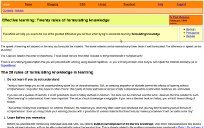"20 rules for learning" is essential reading
 SuperMemo has an article titled ‘Effective learning: Twenty rules of formulating knowledge'. It’s over a decade old now, but contains brilliant advice on modern learning methods. If a decade seems a long time ago for cutting edge advice, remember that the methods used in most classrooms and textbooks today are far older still. This information isn’t new, but it’s still not widely recognised.
SuperMemo has an article titled ‘Effective learning: Twenty rules of formulating knowledge'. It’s over a decade old now, but contains brilliant advice on modern learning methods. If a decade seems a long time ago for cutting edge advice, remember that the methods used in most classrooms and textbooks today are far older still. This information isn’t new, but it’s still not widely recognised.
I would strongly recommend that students have a read of the article, whatever topic they’re studying. Learning how to learn is often ignored or not taken seriously. Some schools and universities may put on the occasional ‘study skills’ session, but these are usually banal and unhelpful. Good learning strategies, however, make an immeasurable difference to success in study. SuperMemo is a source of a lot of good advice in this area. I’m not totally sure about the neuroscientific language used to explain the information, but the principles given are certainly worth remembering.
20 tips for better SRS learning
This is just a short write-up of the rules given in the article, as summaries are always good.
- Always get an overview first. This is an excuse to have a relaxing read of something without analysing it and breaking it apart for specific study; that comes later.
- Learn before memorising. This is pretty much the same rule as above. Get an understanding, then begin memorising the details.
- Begin as basically as possible. It’s easy to assume some information is obvious and neglect it. But incorporating the easy stuff into your study costs little and dilutes the harder material, keeping you motivated.
- Break it down as far as you can. Once you’ve understood the overview, you should completely tear it apart for focused study. This lets you identify the problem areas in the smallest possible detail so that you can concentrate on them without wasting time.
- Cloze deletion. An quick, easy and effective way to force yourself to actively remember the information.
- Use images. I’d add every kind of media you can to this. Audio, video and whatever else you can get hold of will add depth and interest to your learning. It’s all about be efficient and effective, and these media help you do it.
- Mnemonics. Thinking up mnemonics is a very useful skill to develop. They don’t have to be poems or rhymes - any little mental prompt will do. Keep your mnemonics personal and weird, as these work the best.
- Graphic deletion. Just like cloze deletion with text - make yourself remember missing parts of images.
- Avoid sets or lists. You should avoid trying to learn by rote large chunks of organised information. This is very inefficient and frustrating to attempt. If possible, it’s far better to break it down and come at it from several angles.
- Enumerations. If you really have to learn a set (the example given is “Which countries are in the European Union?"), enumerations are the best (least worst) way to do it. It involves ordering the information in a strict sequence so that you can attack it with better methods such as cloze deletion, and also so that it prompts you as you recite it.
- Combat interference. If you learn new information that’s similar to something you already know, the two things can clash in your memory, leading you to forget both of them. The problem won’t rectify itself, so the best way to tackle this is to be consciously aware of it, and treat distinguishing the confusing items as something to be learned in itself.
- Minimum wording. This is similar to tip #4. Always go for the smallest chunks possible. An ‘item’ for review shouldn’t be more than one sentence, and ideally should only be a few words or short phrase.
- Refer to other memories. One way to avoid interference (#11, above) is to directly incorporate it into your studies. Use similar items to reference and contrast each other. This is fast and helps make the differences obvious.
- Personalise. As mentioned above, make your learning as personal as possible, even to the extent that you’d be embarrassed to explain your materials to someone else. You’re teaching yourself, so make use of as many idiosyncratic shortcuts as possible.
- Make it extreme. This is very similar to #14. Use vivid, shocking images and words as mnemonics. No-one else has to know what they are, and they’ll make recall easier.
- Use context and categorising. This is one tip that is actually very well known. Colour-code and otherwise organise your learning materials to make them quicker to produce and use. This also helps you associate related content, which often aids memory.
- Attack from all sides. Don’t settle on one way of learning and reviewing an item - create several, especially for problem information. This is very effective for long-term recall, and also ensures you understand material as well as remember it.
- Provide sources. Make notes of where you got information. This nearly always comes in handy later, and is generally a good habit for students.
- Date. As in #18 - note the date you find things. Information often changes, and it’s also a boost to motivation if you notice that you remember something from years ago.
- Prioritise. This can be very tricky, but you can increase efficiency by prioritising material to be learnt. Anki and other SRS software lets you do this and will handle the scheduling for you.
Link: ‘Effective learning: Twenty rules of formulating knowledge - Super Memo’
